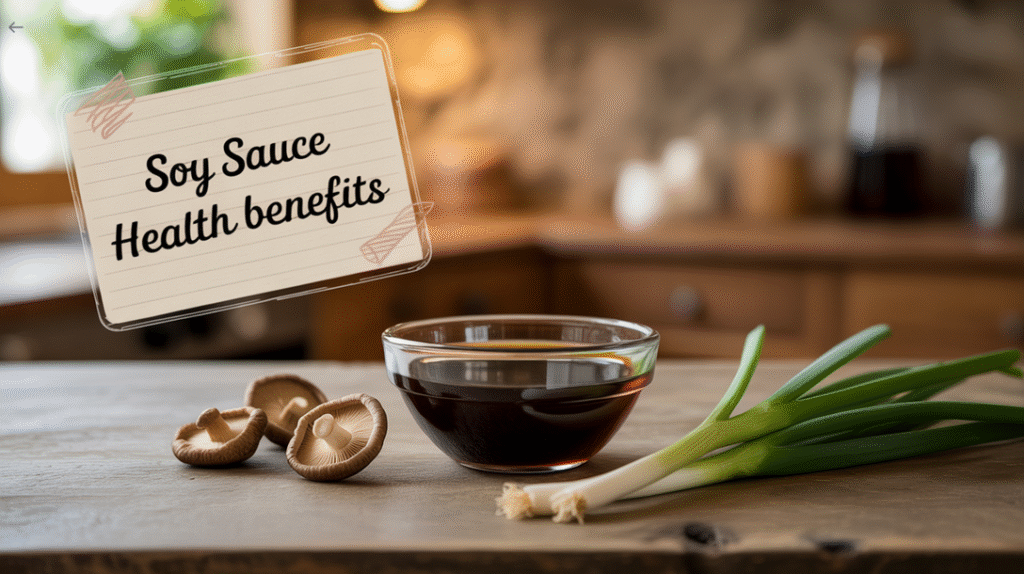Affiliate Disclosure: PantryBrands.co.uk is a participant in the Amazon.co.uk Associates Programme. As an Amazon Associate, we earn from qualifying purchases made through links on this site.
Soy sauce does offer some health benefits, such as antioxidants and gut-supporting compounds, but it also carries risks due to its high sodium content and potential allergens. Understanding both the advantages and concerns helps you use soy sauce wisely in your everyday meals.

In this article, we’ll explore how soy sauce interacts with the body, what nutrients it offers (and lacks), and how to strike a balance between taste and health. This guide uses the latest nutritional research, presented in clear, practical terms for British households.
Is Soy Sauce Good or Bad for Your Health?
The answer depends on how much and how often you consume it. While soy sauce contains beneficial compounds, it’s also high in salt and may not be suitable for everyone, especially those managing blood pressure or sodium-sensitive conditions.
A Balanced View
Like many flavour-enhancing foods, soy sauce is best used in moderation. It’s not a health food, but it’s not inherently harmful either — provided it’s used thoughtfully within a balanced diet.
Key Health Benefits of Soy Sauce
Soy sauce is not typically viewed as a nutritional powerhouse, but it does offer a few surprising health-supportive properties.
Contains Antioxidants
Naturally brewed soy sauce contains antioxidants that help neutralise free radicals.
- These compounds may help reduce inflammation in the body.
- The fermentation process can increase the concentration of antioxidant activity.
May Aid Digestion
Some traditionally brewed soy sauces contain compounds that may benefit gut health.
- Fermented products can contribute to gut-friendly bacteria.
- Small amounts may help stimulate stomach acid production and aid digestion.
Nutritional Breakdown of Soy Sauce
Let’s take a closer look at what soy sauce provides — and what it doesn’t.
Macronutrients
Soy sauce is low in calories, fat, and carbohydrates.
- Typically, one tablespoon contains around 10 calories.
- It offers negligible protein, fat, or fibre.
Micronutrients
Soy sauce contains trace minerals, but not in significant amounts.
- Iron, magnesium, and potassium are present, but in small doses.
- It should not be relied on for essential nutrients.
Health Risks of Regular Soy Sauce Consumption
Despite its benefits, soy sauce does carry notable risks, especially when consumed in excess.
High Sodium Content
Sodium is the most significant health concern associated with soy sauce.
- One tablespoon of regular soy sauce contains about 900–1,000 mg of sodium.
- This is nearly half of the NHS-recommended daily maximum for adults (2,300 mg).
Too much sodium is linked to:
- Increased blood pressure.
- Greater risk of heart disease and stroke.
Allergies and Intolerances
Soy sauce contains soy and often wheat, both common allergens.
- Those with soy allergies should avoid soy sauce entirely.
- People with coeliac disease or gluten sensitivity must choose gluten-free tamari instead.
Histamine Reactions
Fermented foods like soy sauce can be high in histamines.
- Some individuals may experience headaches, rashes, or other reactions.
- Those with histamine intolerance should be cautious.
Choosing a Healthier Soy Sauce Option
Some soy sauces are healthier than others. Choosing the right one can make a difference.
Low-Sodium Soy Sauce
These are specifically formulated to contain less salt.
- Up to 40% less sodium than regular soy sauce.
- Still provides flavour without overwhelming your diet.
Naturally Brewed vs Chemically Produced
Naturally brewed soy sauce is generally considered safer and healthier.
- Traditional brewing results in more antioxidants and fewer chemical residues.
- Chemically produced soy sauces may contain unwanted additives.
How to Use Soy Sauce Safely in a Healthy Diet
Moderation is key. You don’t need to give up soy sauce entirely to stay healthy.
Use Small Amounts for Big Flavour
Soy sauce is potent, and a little goes a long way.
- Limit usage to 1–2 teaspoons per meal.
- Use it as a cooking ingredient rather than pouring it on after.
Balance with Other Ingredients
Pair soy sauce with low-sodium foods and fresh ingredients.
- Vegetables, lean meats, and whole grains help dilute sodium impact.
- Add citrus or vinegar for flavour without adding salt.
FAQs About Soy Sauce Health Benefits & Risks
Here are some questions and answers about the health benefits and risks of soy sauce.
Is soy sauce bad for blood pressure?
Yes, if consumed in large amounts. The high sodium content in soy sauce can raise blood pressure, especially in those already sensitive to salt. Opting for low-sodium varieties and limiting intake is recommended.
Can soy sauce cause allergic reactions?
Yes. Soy sauce contains soy and often wheat, both of which are allergens. Individuals with soy allergies or gluten intolerance should avoid standard soy sauces and consider tamari or certified gluten-free options.
Are there any health benefits to soy sauce?
Yes, traditionally brewed soy sauce contains antioxidants and small amounts of minerals. While these aren’t significant enough to be a health booster, they add minor benefits when consumed occasionally.
Is it OK to eat soy sauce every day?
Daily consumption in small amounts (like a teaspoon or two) is generally safe for healthy adults. However, those watching sodium intake or managing specific health conditions should limit how often they consume it.
What’s the healthiest type of soy sauce?
Naturally brewed, low-sodium soy sauce is considered the healthiest choice. It has fewer additives, better flavour, and reduced sodium levels compared to chemically produced or standard variants.
